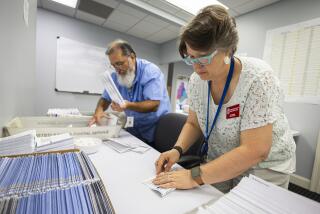Four months out, nomination schedule still up in the air
- Share via
Where does the 2008 calendar stand?
It is still in flux, which is rather remarkable considering that voting is expected to begin in just about four months. Some tentative dates were set months ago, but those are certain to change.
--
So how are things likely to shake out?
Iowa and New Hampshire are determined to maintain their status as hosts of the first caucuses and primary, respectively. Iowa Gov. Chet Culver insists his state will not vote this year. The state is likely to move up its caucuses to somewhere around Jan. 3-6. New Hampshire law requires a seven-day cushion between its vote and any “similar” contest, to avoid diluting its impact. With Michigan discussing a Jan. 15 primary, there has been speculation New Hampshire might waive the requirement, but Secretary of State Bill Gardner rules that out. “It’s the law,” Gardner says.
--
What about those states -- Florida, Michigan, New Hampshire, South Carolina and Wyoming -- that seem ready to defy the national parties by scheduling their vote ahead of the windows set for them?
There is talk of a face-saving compromise in which some states could vote when they please, but apportion their delegates in a separate process. That would allow them to avoid the sanctions -- refusal to have some or all of their delegates seated at next summer’s nominating conventions -- that the national parties are threatening. Saturday’s announcement that leading Democrats would focus on four early states offers some clarity to the Democratic calendar. But plenty of questions remain.
--
Will the threat of sanctions bring states back in line?
That’s unclear, but state party leaders don’t seem too worried -- or least that’s what they say. Many figure the eventual nominees will be more concerned with unity than meting out punishment. “There will be great pressure for a harmonious and consensus-filled convention without acrimony about who gets seated and who doesn’t,” said Jeff Timmer, executive director of the Michigan Republican Party, who predicted any unhappiness by national party leaders “will have diminished significantly by that time.”
--
What about California?
The state has moved its primary to Feb. 5, along with more than a dozen other states, including Georgia, Illinois, Missouri, New York and Tennessee, which will result in the single biggest day of balloting in primary history. That date falls within the prescribed window. The candidates, meantime, are scrambling to compete in what amounts to a national primary.
--
When will all this be resolved?
That’s uncertain. Florida was given 30 days, as of Aug. 25, to come back with a plan that will satisfy the Democratic National Committee or risk having its 210 delegates barred from the Denver convention. Whatever happens in Florida will likely set the pattern for Michigan and any other state that considers violating the national party rules.
On the Republican side, states have been given until Tuesday to submit their plans to the national party. Florida, Michigan, New Hampshire, South Carolina and Wyoming risk sanctions -- the loss of half of their delegates -- for scheduling their vote ahead of Feb. 5, the date prescribed by the Republican National Committee. Sometime before year’s end, the party will issue its formal “call to convention.” Any state that violates the national committee’s guidelines by moving up after that would lose 90% of its delegates to the Minneapolis convention.
--
(BEGIN TEXT OF INFOBOX)
The calendar
January
Jan. 5: Wyoming GOP caucuses
Jan. 14: Iowa caucuses (tentative, may move up)
Jan. 15: Michigan primary (tentative)
Jan. 19: South Carolina GOP (tentative), Nevada caucuses
Jan. 22: New Hampshire (tentative, may move up)
Jan. 29: South Carolina Democrats, Florida (Ohio is considering a proposal to move up its primary to this date from March 4)
February
Feb. 1: Maine GOP caucuses
Feb. 5: Alabama, Alaska caucuses, Arkansas, Arizona, California, Colorado (Democratic caucuses; GOP likely to move its caucuses to this date also), Connecticut, Delaware, Georgia, Idaho (Democratic caucuses), Illinois, Kansas (Democratic caucuses), Minnesota caucuses, Missouri, New Jersey, New Mexico (Democratic caucuses), New York, North Dakota caucuses, Oklahoma, Tennessee, Utah, West Virginia (GOP state convention only)
Feb. 7: Hawaii GOP (tentative)
Feb. 9: Kansas GOP caucuses, Louisiana
Feb. 10: Maine Democrats
Feb. 12: Maryland, Virginia, District of Columbia
Feb. 19: Hawaii Democrats, Washington (nonbinding “beauty contest”), Wisconsin
March
March 4: Massachusetts, Ohio, Rhode Island, Texas, Vermont
March 8: Wyoming Democrats
March 11: Mississippi
April
April 22: Pennsylvania
May
May 6: Indiana, North Carolina
May 13: Nebraska, West Virginia
May 20: Kentucky, Oregon
May 27: Idaho
June
June 3: Montana, South Dakota
August
Aug. 25-28: Democratic National Convention in Denver
September
Sept. 1-4: Republican National Convention in Minneapolis
All dates as of Aug. 31.
--
Source: Associated Press
More to Read
Get the L.A. Times Politics newsletter
Deeply reported insights into legislation, politics and policy from Sacramento, Washington and beyond. In your inbox twice per week.
You may occasionally receive promotional content from the Los Angeles Times.











